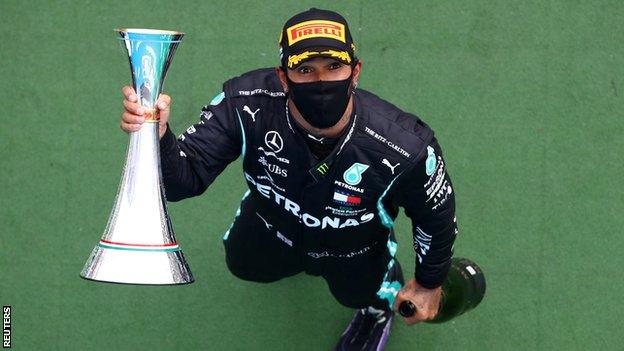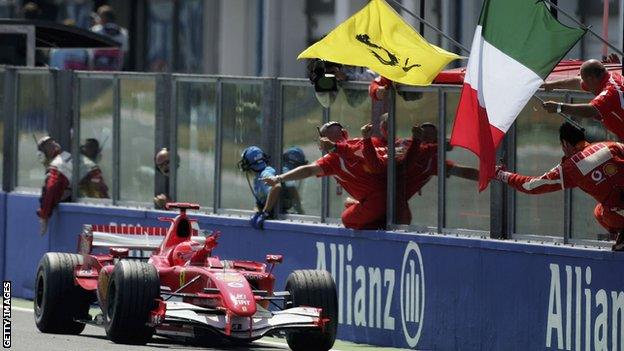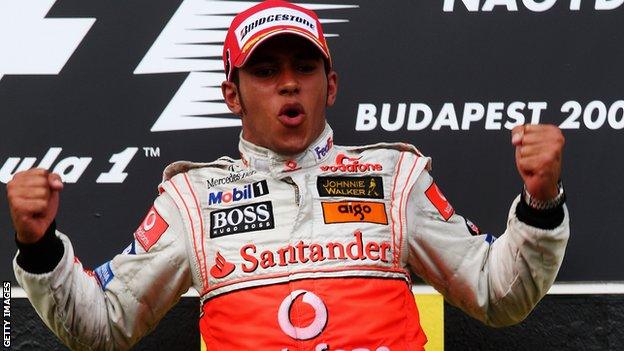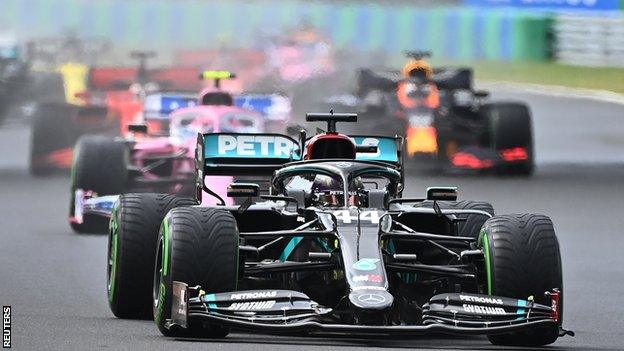Lewis Hamilton driven by pain of past failures after Hungarian GP win
- Published

The British Grand Prix is live on 5 live and the BBC Sport website from 31 July
"It was a pretty beautiful day," Lewis Hamilton said after winning the Hungarian Grand Prix at a canter, and - from his point of view - he wasn't wrong there.
The Mercedes driver's victory, founded on a remarkable opening three laps in which he pulled eight seconds on the rest of the field in difficult damp conditions, put him in the championship lead for the first time this year.
And while Hamilton is, as he puts it, "not one for numbers", it also set a number of major statistical landmarks.
It brought Hamilton level with Michael Schumacher as the driver with the most wins at a single circuit.
It was the 86th victory of Hamilton's career, and he is now just five short of Schumacher's all-time record of 91 - a record that looks increasingly likely to fall this season.
And it came a day after Hamilton took his 90th pole position. A remarkable tally that is 22 clear of the next closest driver, who is - you guessed it - Schumacher.
Not only that, but it was the climax to a weekend on which Mercedes had shown an enormous level of superiority over the rest of the field.
The only negative was the rushed and haphazard anti-racism demonstration by the drivers before the race - a topic on which a disappointed Hamilton did not mince his words afterwards.

Hamilton won in Hungary for the eighth time, equalling Michael Schumacher's record of winning the French Grand Prix eight times - the last being in 2006, above
'I am not giving up any points unless I have to'
Hamilton and team-mate Valtteri Bottas were a second faster than anyone else in qualifying, and in the race Hamilton had enough of a gap by the final laps to make a 'free' pit stop for fresh tyres with which he could secure fastest lap - and take the point for it off the Finn.
Securing that two-point swing was symbolic of the level of determination Hamilton has to win his seventh title - and draw level with Schumacher on another all-time record - in this coronavirus-affected season which still doesn't have a completed calendar.
Hamilton went to Hungary six points adrift of Bottas.
"I know what it's like to lose the championship by one point and I am not giving up any unless I have to," Hamilton said. "I know how crucial it is to maximise every moment.
"We don't know what reliability is going to be like. We don't know how long the season is going to be. Valtteri had a great first race. And at the time he had fastest lap. I had the gap and I felt it was necessary to get that point, particularly as I felt I had earned the gap I had."
In those remarks is evidence of how much it still hurts Hamilton that he lost out on championships in 2007 and 2016 in the way he did.
In 2007, he should have become the first man in history to win the title as a rookie. But a strategy miscalculation at the Chinese Grand Prix by McLaren left him out too long on worn tyres, and he slid into the gravel trap and retirement when they finally called him in.
Those errors opened the door for Ferrari's Kimi Raikkonen, and when Hamilton had reliability problems at the final race, Ferrari manipulated Raikkonen's team-mate Felipe Massa out of the lead by delaying his final pit stop and handed the win to Raikkonen, who took the title from Hamilton by that single point he mentioned.
Then in 2016, at Mercedes, Hamilton was much more badly affected by reliability than team-mate Nico Rosberg.
Hamilton's superiority over Rosberg meant he could still have won the title even with the many points he lost as a result, but he didn't help himself with a couple of bad starts and two or three off-form race weekends. Even so, it was the reliability that really cost him, and he still lost out by only five points.
Hamilton learned a hard lesson that year, and he emerged as a stronger competitor, moving his all-round game on to another level. He has kept the mercurial speed but added another level of consistency and focus on the bigger picture, and it has made him an even more formidable opponent.

Hamilton took the first of eight wins in Hungary in 2007
Bottas staying resolute
It was this consistent excellence that won Hamilton his titles in 2017 and 2018 against a Ferrari car that was faster for much of those seasons, but was driven and operated by a driver and team who made more mistakes.
This is what Bottas has to face this season, in a year that looks already as if it will be a private fight between the two Mercedes drivers.
"At this point, yes," Bottas said, "based on two different tracks, we seem the best car and sometimes with a big margin. If you ask anyone, they would predict it would be between me and Lewis.
"But you just never know how the season will go and if we start to think that way it is going to be a mistake so we will continue to keep pushing."
Bottas got the season off to a good start, with a dominant win in Austria, while Hamilton made a series of small but important errors and finished fourth.
But in the two subsequent weekends, it is Bottas who has been found wanting - at least in the context of the man he has to beat.
Ending a wet qualifying session in the second Austrian race 1.4 seconds slower than Hamilton cannot have helped Bottas' confidence. And then in Hungary, after losing out on pole by just under 0.2secs in a much closer fight with Hamilton, Bottas wrecked his chances with a bad start and dropping to sixth on the opening lap.
He fought back well enough, but then failed to pull off exactly the same strategy gamble with which Hamilton had won the race last year - taking an extra set of tyres and racing back up to the back of Verstappen in an attempt to pass before the end.
"My performance has been good," Bottas said. "There have been some I would even say maybe unlucky events that have cost me a little bit but performance-wise I am pleased.
"It is a very encouraging start. I do have the pace this year to win the title but it is an individual battle every weekend.
"It didn't go right in Austria wet qualifying or this weekend for the race start but each weekend I have learnt massively. I had pole in Silverstone last year so I am confident going there (next). I know Lewis is strong there as he is strong everywhere, but I also believe in my ability to beat him."

How do Mercedes do it?
Mercedes had expected Red Bull to pose a stronger challenge around the Hungaroring, but they were nowhere in qualifying.
Then, Verstappen looked to have wrecked his hopes of a recovery in the race when he crashed on the formation laps.
He managed to extricate the car from the barriers and the mechanics performed wonders to change the front wing and two parts of the front suspension in 12 minutes before the start.
Verstappen made a brilliant start and first corner to be third behind Hamilton and Lance Stroll's Racing Point. He despatched Stroll within four laps but there was nothing he could do about the man in the lead.
For anyone not part of Mercedes, this is already looking like a dispiriting season. But while domination might not make a great spectacle, there is only respect and admiration for them within the sport.
On Thursday, Hamilton described this year's Mercedes as "the best car we've had so far" and on Friday technical director James Allison was asked how the team continue to set such a high bar.
"We've been a well-funded team, we've been a stable team, we've had strong support from our parent company and consistent leadership," Allison said.
"But I think one of the best things about the place is that it has a good culture. And the culture is one of not resting on its laurels, never feeling entitled to the performance we've enjoyed and being willing to pass the challenge of finding improvement in the car down from the top of the team through the layers in the team.
"So everyone feels a part of making the car stronger, racing the car more strongly, providing us with the environment in which we can make that strong car.
"All parts of the many-cogged machine that is an F1 team play their part in producing what you see. It's not a single answer; it is down to a team with a good culture in it."

Hamilton was the clear leader from lights out
Hamilton said: "I definitely didn't leave anything on the table today, I would say.
"The thing is, we all go back now (from the news conference to the engineers' room) and the way we work is that there's a couple of minutes of everyone smiling and then everyone's dead serious - if they're not already dead serious.
"You get in there and sometimes you really have to ask them: 'Are you guys happy?' And then like: "Yeah, yeah, yeah, yeah." And then we get back to work.
"We get our headsets on and we talk about the car. And when we talk about the car it's not: 'Everything was great.' It's: 'This could be better, this could be better, that could be better.'
"Valtteri is really great with his input and we try to push the team forwards, and everyone is just working to see how they can improve.
"No matter if there is or is not a gap between ourselves and another team, we just keep pushing and keep elevating. And for me that's the most impressive thing about this team."
The story behind Lewis Hamilton's tattoos
